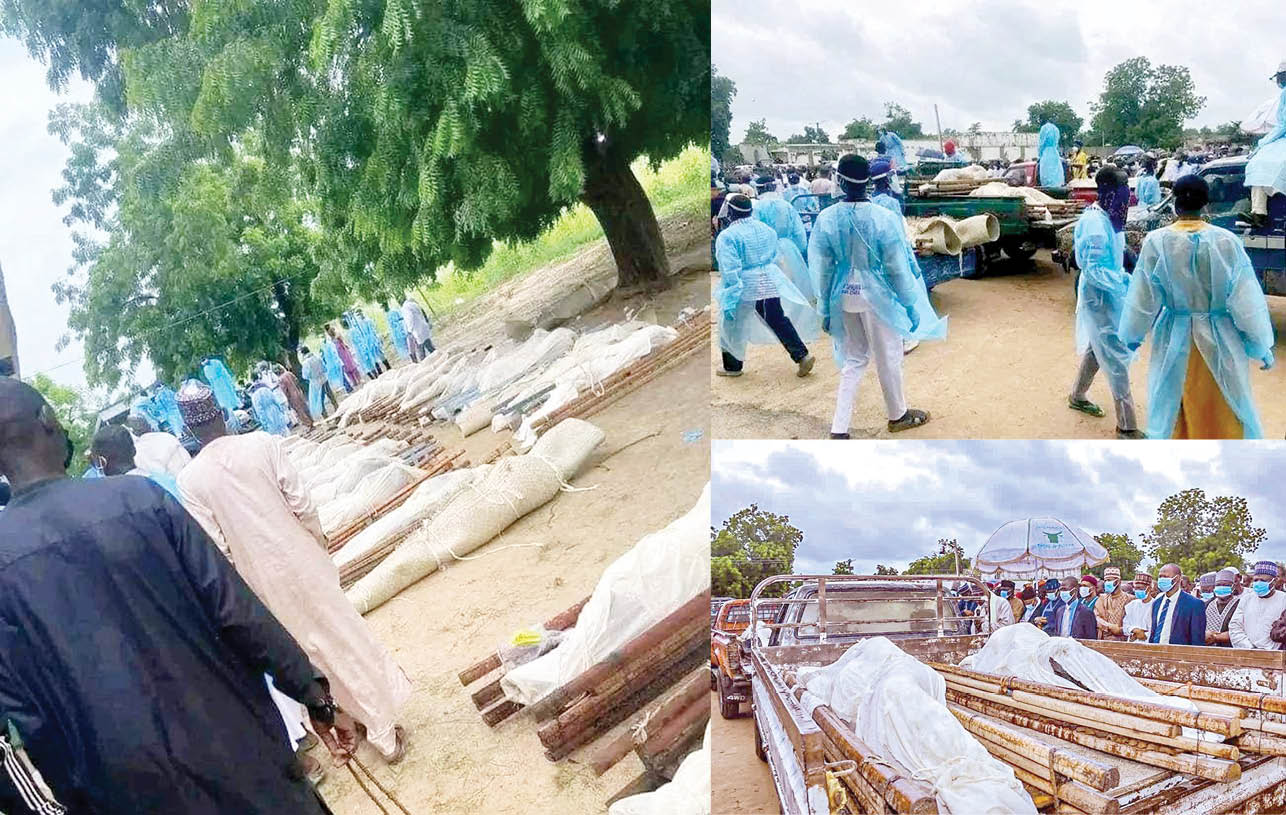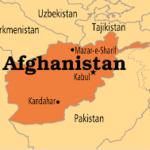In just over two months, Yobe and Borno states have experienced four devastating attacks by Boko Haram and its splinter group, the Islamic State West Africa Province (ISWAP) that led to the death of at least 122 persons.
These attacks mostly targeted communities where the inhabitants have enjoyed several years of relative peace.
While there is no dispute to the fact that the Nigerian securities have degraded the capabilities of the insurgents, these recent incidents have left many people confused.
One of the deadliest attacks came on the 1st of September, 2024, when ISWAP terrorists, who claimed responsibility, shot dead scores of people in Mafa town, Tarmuwa Local Government Area of Yobe State.
Corpses of the victims of the dastardly act were evacuated from the scene and buried in Tarmuwa town amidst tears by their loved ones. The state deputy governor, Idi Barde Gubana, was present.
The community was left shattered, struggling to tally the figure, as many survivors insisted that the number of deaths mentioned by the authorities was far beyond 34.
One of the survivors, Umar Abubakar said they buried over 50 decomposed bodies in Mafa and the surrounding villages, adding that, “we recovered 87 corpses, still searching for our relatives who escaped to the bush with bullet wounds”.
It was the first time in recent years that the Boko Haram insurgents came out to claim responsibility for an attack on innocent lives.
On the 28th of July, 2024, the suspected Boko Haram terrorists also invaded Jakana police station in Konduga LGA of Borno State, killing a police driver and his female friend.
The terrorists also set ablaze two patrol vehicles belonging to the police and members of Civilian Joint Task Force (CJTF) a motorcycle and carted away arms and ammunition.
Boko Haram attacks were also propelled by a sharp rise in IEDs and suicide bombings that killed many civilians and security operatives on the fringes of Sambisa forest and the lake Chad region.
On Saturday, June 29, multiple suicide bombings in the town of Gwoza, Borno State, resulted in at least 32 deaths and more than 100 injuries.
These attacks, suspected to be orchestrated by Boko Haram were carried out by three female suicide bombers that targeted a wedding reception.
Penultimate Sunday, ISWAP fighters claimed responsibility for the Mafa attack, but no individual or group has claimed responsibility for the suicide bombings that took place in Gwoza. Many pregnant women, children and men were killed in the attacks.
In another incident, a high court judge, Justice Haruna Mshelia, alongside his wife, driver and orderly, were abducted by the Boko Haram insurgents on his way to Maiduguri.
Sources revealed that the Justice was traveling on the Biu-Bundi Yadi-Damaturu-Maiduguri road, when the insurgents stopped his car.
The whereabouts of the judge and his family are still unknown and no one has claimed responsibility for the abduction.
This happened barely two months after the Boko Haram terrorists ambushed a military vehicle conveying a Lieutenant and other soldiers on the same route, killing the military officer and injuring four other soldiers.
Beyond these attacks, Yobe and Borno states are facing an array of security challenges that threaten socio-economic life of people in the North-east region.
Returnee communities fear insurgents attack
With these attacks, villagers, especially those who recently returned to their communities have continued to express fear.
One of the villagers in Mafa, Ali Musa, lamented that both Boko Haram and ISWAB insurgents have returned with their attacks.
“We live in a perpetual fear now knowing that the terrorists can strike at any time. Some of us were forced to abandon our farmlands due to the activities of the insurgents.
“Many of us are forced to pay Jizya tax to the insurgents before we get access to our farmland. Now that it’s the harvest time, we fear for our lives. If enough security is not provided, most farmers will not be able to harvest their crops”, he said.
Another villager at Gwurimeri village, near Dalwa, in Konduga Local Government Area, said the community is encircled by the Boko haram militants who are collecting levies from them.
“We were invited by the ISWAP fighters and negotiated how much we will pay to allow us to harvest our crops. We have already paid the first part of N250,000, while the remaining amount will be paid after the harvest.
“They didn’t disturb us when we were preparing the land for cultivation until the crops became ready for harvest. We reported the terrorists’ presence in the past but the security operatives could not do much,” he said.
Ndume cries out as B/Haram members loot unripe crops
The senator representing Borno-South, Mohammed Ali Ndume, has raised concern over the Boko Haram terrorists who have resorted to looting unripe crops in communities in Gwoza LGA of Borno State.
Ndume, who toured 10 displaced and newly resettled communities in Gwoza, said he received complaints from his constituents and appealed to the military to intensify efforts and clear the remnants of Boko Haram in the area.
Ndume, who is the former Chairman, Senate Committee on Army, noted that the recent attacks have caused serious economic setbacks.
“The terrorists have resorted to looting unripe crops of many resilient farmers that settled recently in liberated communities like Ngoshe, Kirawa, Warabe, Wala, Pulka and even Gwoza town, the council headquarters.
“I want to use this medium to appeal to the military and other security agencies to intensify efforts aimed at clearing remnants of terrorists still hibernating in Sambisa forests and parts of Mandara mountains bordering Cameroon Republic and Nigeria,” he added.
CSOs ask military to review operations
Comrade Bulama Abiso, the Executive Director, Network of Civil Society, Borno State, said the resurgence is unfortunate and condemnable.
Abiso, who appreciated the efforts put in by the military personnel and other security agencies said there were lapses that insurgents took advantage of to carry out the heinous attacks.
“We still believe that there are lapses in some quarters. Lapses in the sense that when Boko Haram is not completely over run, there is no need for security agencies to relax. I believe that there is relaxation on the part of the security agencies,” he said.
Abiso also described ineffective civil-military relations as a major setback that could have triggered resurgence of the attacks.
“I want to suggest that the civil-military relations be tightened so that the securities can rely on the information given to them by the community and promptly respond to it.
“Also, the orientation that soldiers who go out to save a situation must receive instructions from the above, such that he cannot even properly defend himself must be looked into.
“Officers should be allowed to have some degree of responsibility to where they can promptly respond to the situation on ground, not until when they receive instructions. Before that instruction comes, the worst may have been done to the community,” he said.
Security expert proffers solution
Former Chief of Defence Intelligence, Brigadier-General Halliru Akilu (rtd) has called on Nigerian leaders to emulate the approaches adopted by former President Ibrahim Badamasi Babangida.
Akilu spoke while contributing to a virtual international colloquium on the legacies of his former boss, President Babangida, in Ghana.
He said, under the eight-year rule of Babangida, Nigeria went through turmoil and uncertainties capable of derailing the country, but he always took decisive steps to restore peace and order.
He observed that with the current spate of Boko Haram insurgency, banditry, kidnappings and general insecurity in the region, leaders should replicate the ECOMOG model enunciated by the Babangida government to restore peace and economic freedom.

 Join Daily Trust WhatsApp Community For Quick Access To News and Happenings Around You.
Join Daily Trust WhatsApp Community For Quick Access To News and Happenings Around You.


